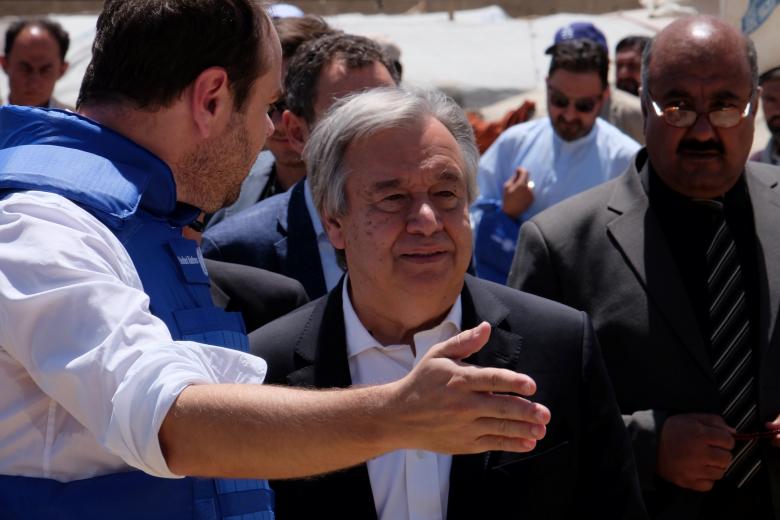As insurgents are making advances on the ground in Afghanistan, United Nations Secretary General Antonio Guterres declared on Wednesday that there is no military solution to the conflict in the country.
He made his remarks on an unannounced visit to the war-torn country.
Guterres’ first visit as secretary general comes as the Afghan government faces internal turmoil, insurgents make gains nationwide and the international military coalition mulls plans to send thousands more troops to help struggling Afghan forces.
These combined threats have worsened the crisis for refugees and internally displaced people, forcing international bodies like the United Nations to call for emergency funding.
The crisis can only be solved by ending the war, said Guterres, standing in a makeshift camp on the outskirts of Kabul that accommodates Afghans displaced by fighting.
“Peace is the solution for the problem,” said Guterres, previously a UN’ high commissioner for refugees.
At least 126,000 Afghans have been forced to flee their homes, the UN says.
More than 218,000 Afghan refugees have also returned this year from neighboring Iran and Pakistan, many citing pressure from authorities there.
The International Organization for Migration estimates that at least 600,000 refugees could return this year, piling strain on aid groups struggling to help the newly displaced.
Guterres was set to meet Afghan President Ashraf Ghani, who is trying to soothe domestic political tension after recent violence in the capital, Kabul.
Ghani also hosted international delegations last week in a bid to set the stage for peace negotiations with the Taliban, which have remained stalled amid widespread fighting.
If the Taliban do not begin negotiations soon, Ghani will seek new UN sanctions against the group as a sponsor of terrorism, he told the June 6 meeting.
Any sanctions would be up to the UN Security Council, Guterres said. Afghanistan has endured too many “foreign interventions”, however, he added, urging an eventual deal to resolve the war.
Thousands of international troops remain in Afghanistan to train and assist Afghan forces, besides mounting counter-terrorism operations.
US President Donald Trump has given Defense Secretary Jim Mattis the authority to set troop levels in Afghanistan, opening the door for future troop increases.
US officials, who spoke to the Associated Press on condition of anonymity because they weren’t authorized to discuss the decision publicly before an official announcement, said the move gives Mattis the ability to adjust troop levels more quickly. Mattis can also end the current cap on Afghanistan troop levels.
On Tuesday, US senators sharply criticized Pentagon leaders for not completing a new strategy for the 16-year-old war in Afghanistan, as Mattis acknowledged that “the enemy is surging right now.”
At the Senate hearing earlier, Sen. John McCain demanded that Mattis wrap up his plan for the war, threatening that, “unless we get a strategy from you, you’re going to get a strategy from us.” He said he had expected the plan in the first 30 to 60 days of the new administration and snapped: “We want a strategy. I don’t think that’s a helluva lot to ask.”
Mattis, in response, told the Senate Armed Services Committee that he will provide details on the new strategy for the war in mid-July.
The US has about 8,400 troops in Afghanistan. Army Gen. John Nicholson, the top US commander in Afghanistan, has told Congress that he could use an infusion of US and allied troops to bolster support for the Afghan army.
Earlier this year, the Pentagon was considering a request for roughly 3,000 more troops, mainly for training and advising. That decision, however, has been stalled by the broader administration review of Afghan policy and a push for NATO to contribute more troops.
The Afghanistan war has been dragging on since October 2001, and the US-led coalition ended their combat mission against the Taliban in 2014 but they are increasingly involved in backing up Afghan forces on the battlefield.
